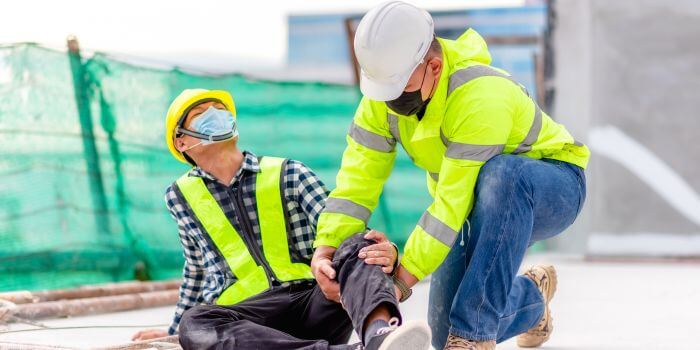Table of Contents
Workers’ Compensation
Construction workers in Georgia are exposed to a higher risk of workplace injuries due to the nature of their work.
A construction accident usually results in severe injuries, potentially leaving the workers partially or completely disabled.
However, this is where workers’ compensation comes in to aid and compensate injured workers because it provides crucial financial support and protection.
A workers’ compensation lawyer can help victims pursue fair compensation and other benefits for their unfortunate incident.
If you have suffered a construction accident while performing your duties and face issues while pursuing your rights for workers’ compensation, contact a workers’ compensation attorney immediately.
Construction sites are dynamic environments with multiple potential hazards. Understanding the risks involved is crucial for both workers and employers to promote a safe work environment. Some common occupational risks faced by construction workers in Georgia include:
Physical Injuries
Construction sites can be hazardous environments for various reasons. The risk of falls, slips, trips, and being struck by heavy objects is high.
Workers are also exposed to dangerous machinery and heavy equipment, including moving vehicles, which all increase the likelihood of injuries.
Common physical injuries in construction sites include fractures, sprains, lacerations, repetitive motion injuries, musculoskeletal injuries, and other traumatic injuries. However, fatal accidents can also occur.

According to the U.S. Bureau of Labor Statistics, there were 187 fatal work injuries in Georgia in 2021 alone.
Falls, for example, often result in fatalities since workers perform their duties at elevated heights, such as on scaffolding or rooftops, and falling from such heights can easily result in severe injuries or fatalities.
In some instances, when workers perform their duties around electrical lines or in proximity to live electrical equipment, there is an increased risk of electrocution.
Occupational Illnesses
Construction workers aren’t only susceptible to physical injuries. They might also be exposed to hazards like asbestos, silica, various dangerous chemicals, lead, and even high noise levels that can negatively affect their health.
Prolonged exposure to these hazards can lead to various occupational illnesses, such as respiratory problems, hearing loss, and other long-term health conditions.
Work-Related Accidents & OSHA Compliance
Construction work is complex and dangerous, so different accidents can occur, resulting in serious injuries.
Those accidents may involve scaffolding collapses, crane accidents, electrocutions, trench collapses, and more.
In some instances, accidents can occur due to the negligence of an employer or other worker.
If a work colleague is responsible for your construction accident, your employer is still partially responsible under the legal principle of “vicarious liability.”
An employer in Georgia has a legal responsibility to provide a safe and healthy work environment for their employees, especially for those in the construction industry.
This also means they are responsible for ensuring proper training, enforcing safety protocols, and addressing any employee misconduct or negligence contributing to accidents.

The Occupational Safety and Health Act (OSH Act) and the regulations set forth by the Occupational Safety and Health Administration (OSHA) establish the standards employers must follow to protect workers.
Employers are required to comply with OSHA standards that specifically apply to the construction industry.
These standards cover various topics, including fall protection, hazard communication, scaffolding, electrical safety, personal protective equipment (PPE), and more.
Employers must ensure their construction sites adhere to these standards to minimize risks and create safer work environments.
Apart from providing comprehensive safety training to construction workers, including the proper use of personal protective equipment, they also must ensure that workers have access to appropriate safety equipment, such as hard hats, gloves, safety glasses, fall protection systems, and respiratory protection when applicable.
An employer must also regularly evaluate construction sites to identify potential hazards and implement appropriate risk mitigation controls.
Should an accident occur due to another worker’s negligence, you, as the injured party, are legally entitled to pursue compensation from both your employer and the negligent worker.
Workers’ Compensation Protections in Georgia
To protect construction workers in Georgia, the state’s workers’ compensation system offers several key protections:
Medical Benefits
Workers’ compensation provides coverage for reasonable and necessary medical treatment related to work injuries or occupational illnesses, including:
- Doctor visits or hospitalization
- Surgical procedures
- Medications, rehabilitation services, and other approved medical expenses
Wage Replacement
Workers ‘ compensation provides wage replacement benefits when a construction worker is temporarily unable to work due to a work-related injury.
This often amounts to two-thirds of the worker’s average weekly wage, which is subject to maximum and minimum limits.
Permanent Disability Benefits
In some construction accidents, workers sustain a permanent impairment due to the injury, which is when workers’ compensation provides permanent disability benefits.
They compensate for the long-term impact on the worker’s ability to earn a living. The benefits depend on the severity of the impairment, the body part affected, and the worker’s pre-injury wages.
Vocational Rehabilitation
If construction workers cannot return to their jobs due to their work-related injuries, workers’ compensation can provide vocational rehabilitation services.
These services include job retraining and specialization, job placement assistance services, and more support to help the injured worker transition to alternative employment.
Workers’ Compensation Legal Considerations

Georgia follows the no-fault insurance system when it comes to workers’ compensation.
This means that an injured worker does not have to prove negligence to receive the benefits of workers’ compensation.
Workers are sometimes entitled to these benefits even if they cause their own injuries. However, if a worker injured themselves due to not following safety protocols, or engaging in work-related activities while under the influence of drugs or alcohol or other willful misconduct, they might have their workers’ compensation denied.
To ensure that injured workers have enough time to file a workers’ compensation claim, Georgia has implemented a one-year statute of limitations to file a claim.
If you do not file a claim within one year since the accident occurred, you may be barred from receiving the benefits of workers’ compensation.
Even though workers are protected by worker’s compensation, an attorney can ensure that employees are fairly compensated for their injuries, maximize their claims, and help them gain all their rights from workers’ compensation.
There are instances where more than one party may be liable for the accident, such as the manufacturer of a defective product.
In other cases, your claim might be delayed or denied for no good reason, and other scenarios can make it more difficult for workers to pursue their claims.
However, with a proper workers’ compensation attorney by your side, you can ensure that your rights are protected, understand the legal processes, and have legal guidance till the end. Contact an attorney right away to learn more.
Also, Read
Can Subcontractors Sue Contractors for Construction Accidents?
Efficiency in Chaos: Managing Your Construction Site